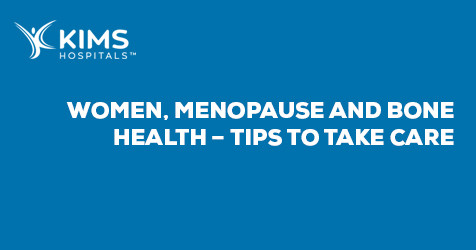WHAT IS MENOPAUSE?
Menopause is a normal condition that all women experience as they age. The term "menopause" can describe any of the changes a woman goes through either just before or after she stops menstruating, marking the end of her reproductive period. Women gradually lose bone density from the age of about 35. But after the menopause, bone loss speeds up.
Women can lose up to 20% of their bone density in the five to seven years after the menopause.
This makes post-menopausal women more at risk of osteoporosis (weak bones) and fractures.
WHY DOES BONE LOSS SPEED UP AFTER THE MENOPAUSE?
The rapid dip in bone density after the menopause is caused by falling levels of the female hormone oestrogen. Oestrogen helps to protect bone strength.
HOW TO KEEP BONES STRONG AFTER THE MENOPAUSE?
Osteoporosis is more common after the menopause, but women often aren't aware that they have it. Here are some simple steps you can take before or after the menopause to protect your bone health.
Stay Active: Even if you haven't been physically active before, adopting an active lifestyle after the menopause will help to protect your bones. It's recommended that adults aged 19 to 64 do at least 150 minutes of moderate-intensity activity in bouts of 10 minutes or more each week. This could include activities such as cycling or brisk walking.
Weight-bearing exercises and resistance exercises are particularly important for improving bone strength and helping to prevent osteoporosis. This is because they place stress on the muscles and bones, which helps to strengthen them. With resistance exercises, you use your muscle strength to work against resistance.
Eat Balanced Diet: A healthy, balanced diet that includes calcium and vitamin D will help maintain healthy bones after the menopause. Good sources of calcium include green, leafy vegetables (but not spinach), nuts, seeds, dried fruit, tinned fish with the bones in, and dairy products like milk, yoghurt, and cheese. Lower-fat dairy products contains just as much calcium as full-fat ones. Good food sources of vitamin D include oily fish, eggs, and fat spreads or breakfast cereals fortified with vitamin D, although it can be difficult to get enough vitamin D from food alone. Therefore, all adults are advised to consider taking a daily vitamin D supplement.
Sunlight and Vitamin D: Sunlight on your skin triggers the production of vitamin D so you might choose not to take a vitamin D supplement. Take care not to let skin redden or burn.
Limited Alcohol and Quit Smoking: Smoking is linked to a higher risk of osteoporosis as is drinking too much alcohol. Quitting smoking will also help to lower your risk of heart disease, cancer and other smoking-related diseases.
Hormone Replacement Therapy (HRT) and Bone Health: HRT can be an effective treatment for common menopausal symptoms like hot flushes, night sweats, sleep disturbance, and achy joints. It works by replacing oestrogen, which naturally begins to drop before the menopause. HRT can also help to maintain bone density and reduce the risk of osteoporosis. HRT isn't suitable for all women and some women prefer not to take it, but it is recommended for certain groups.
WHY KIMS?
KIMS’ Bone Health Services team provides comprehensive treatment options – including medication and exercises to help you achieve optimal bone health.
